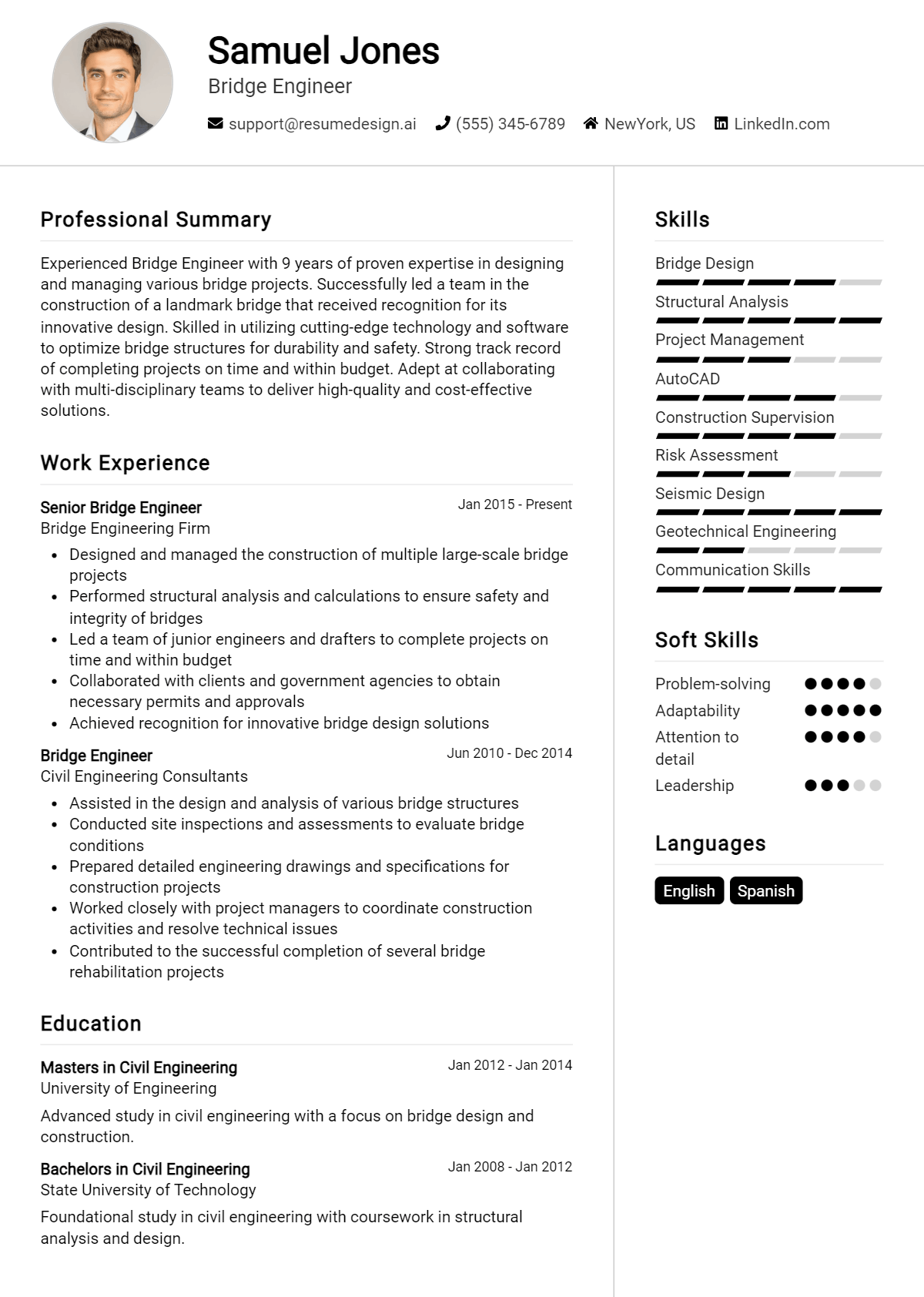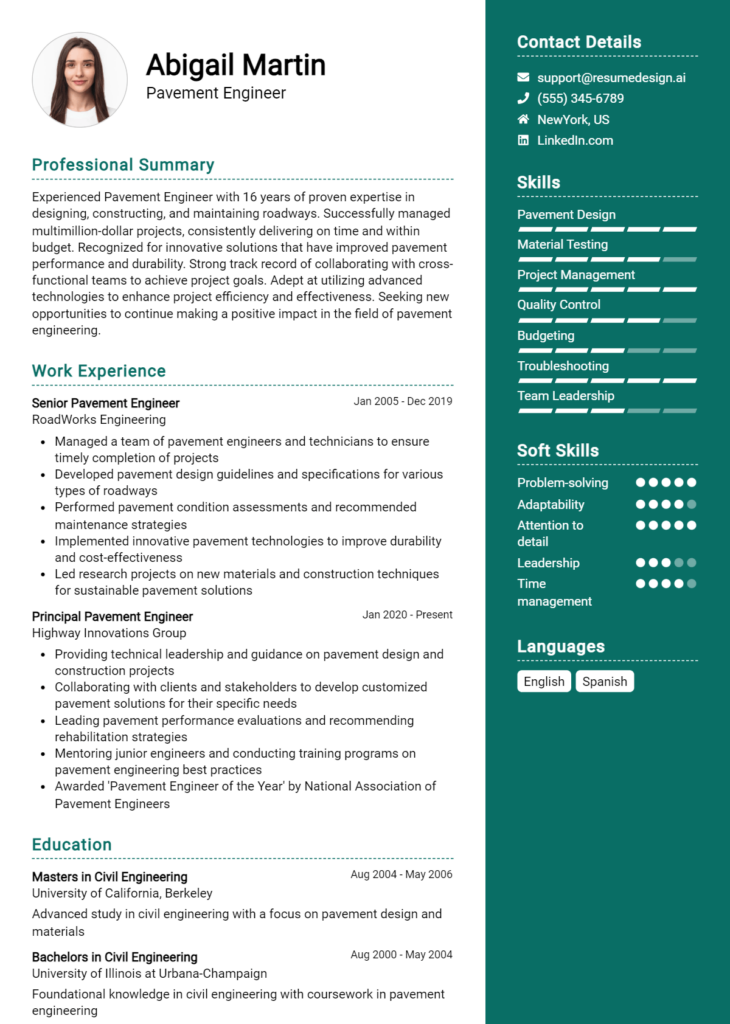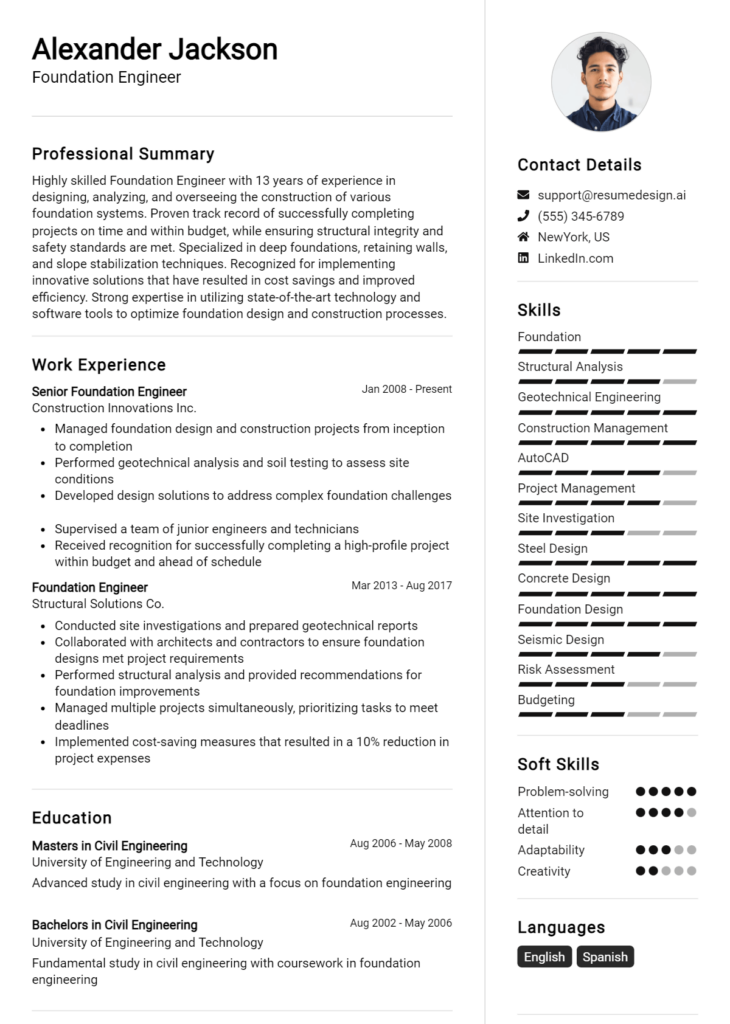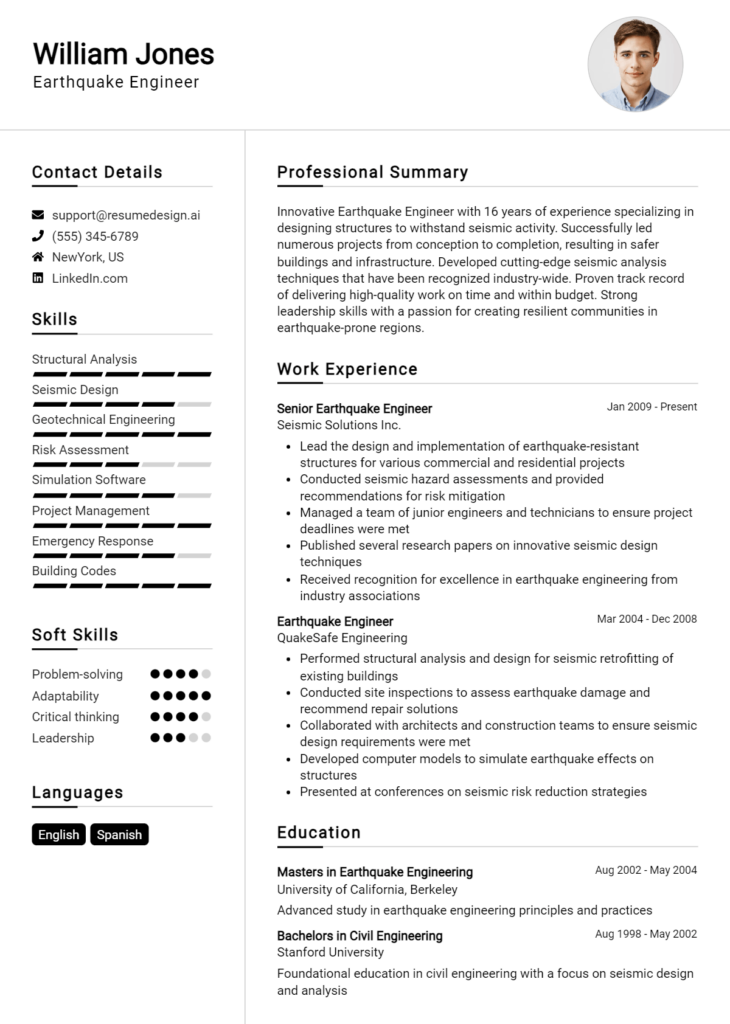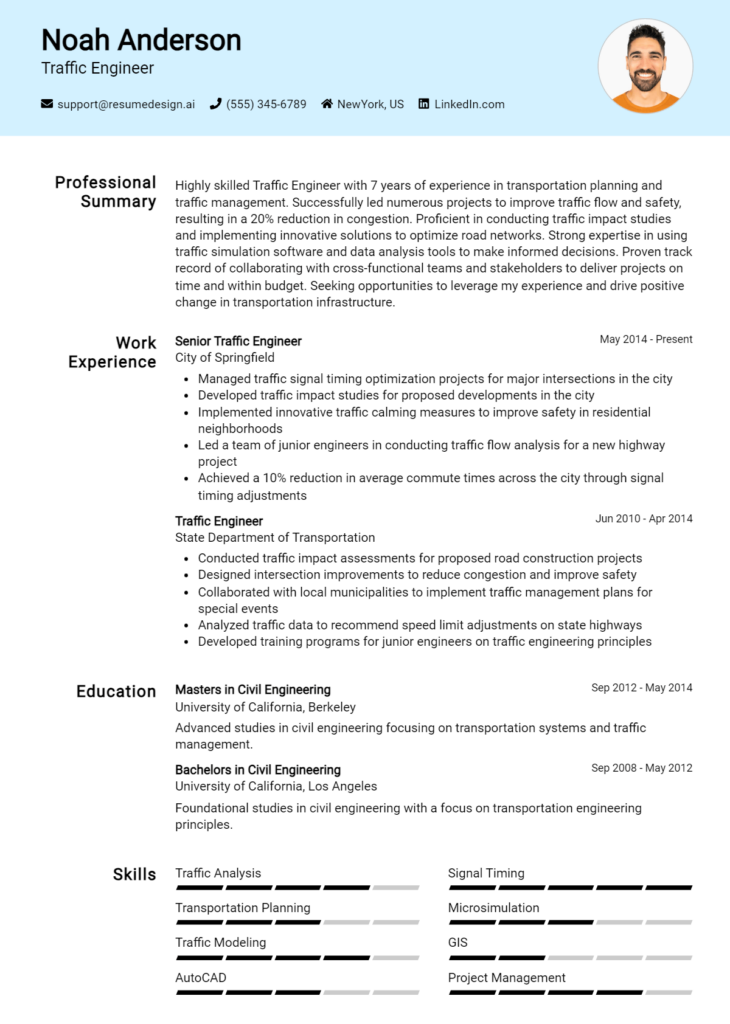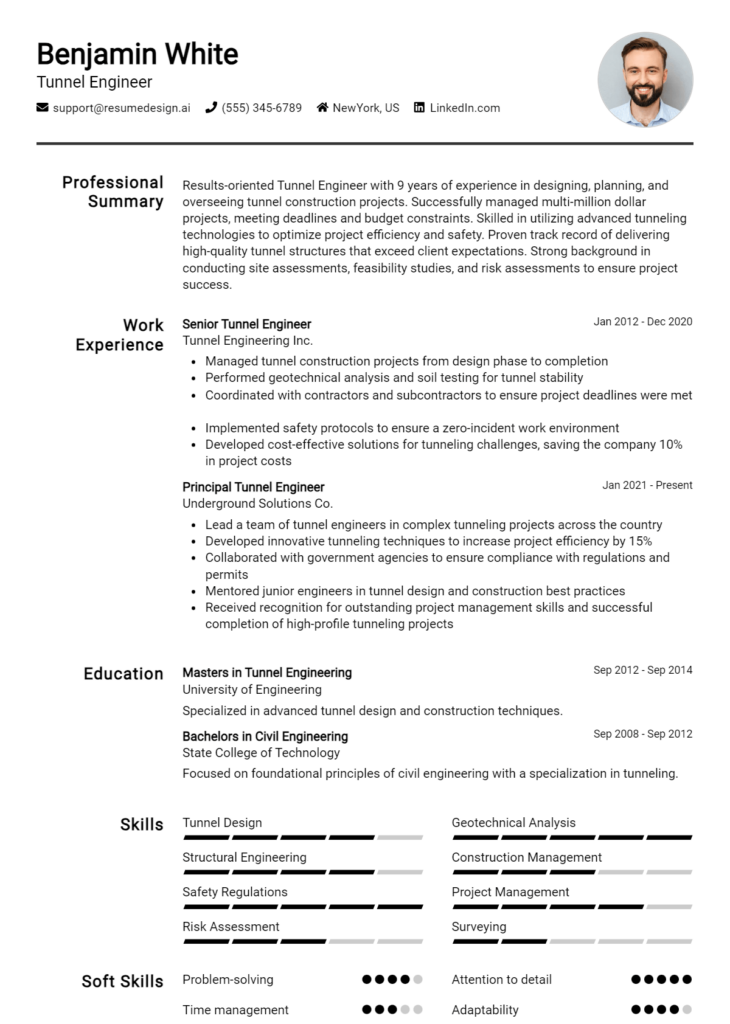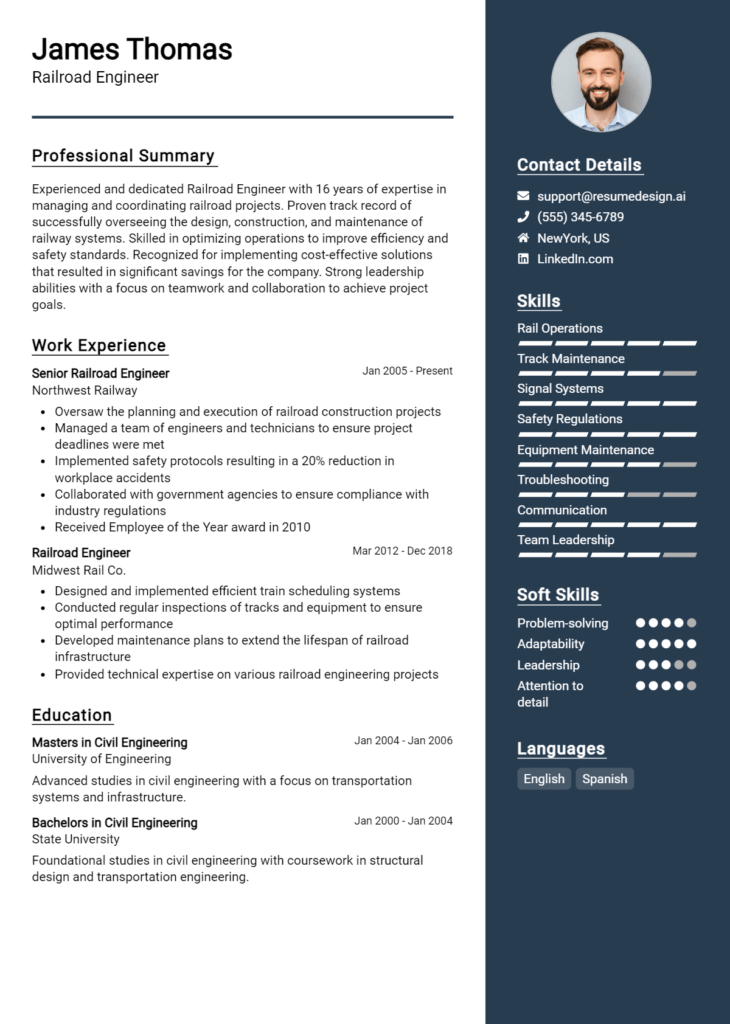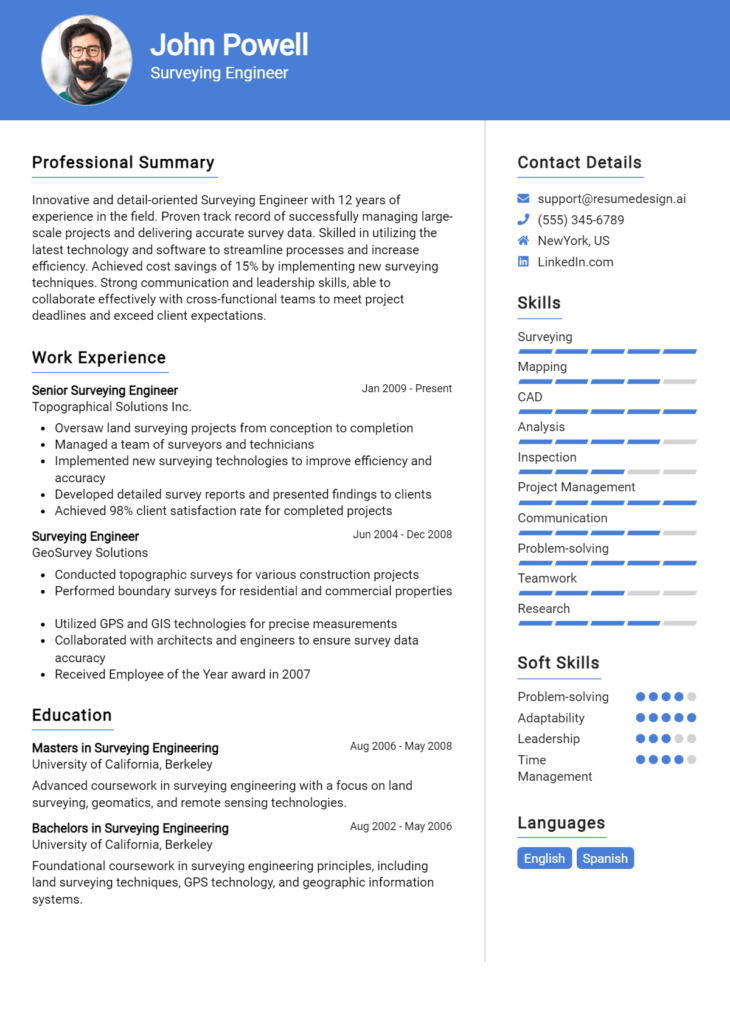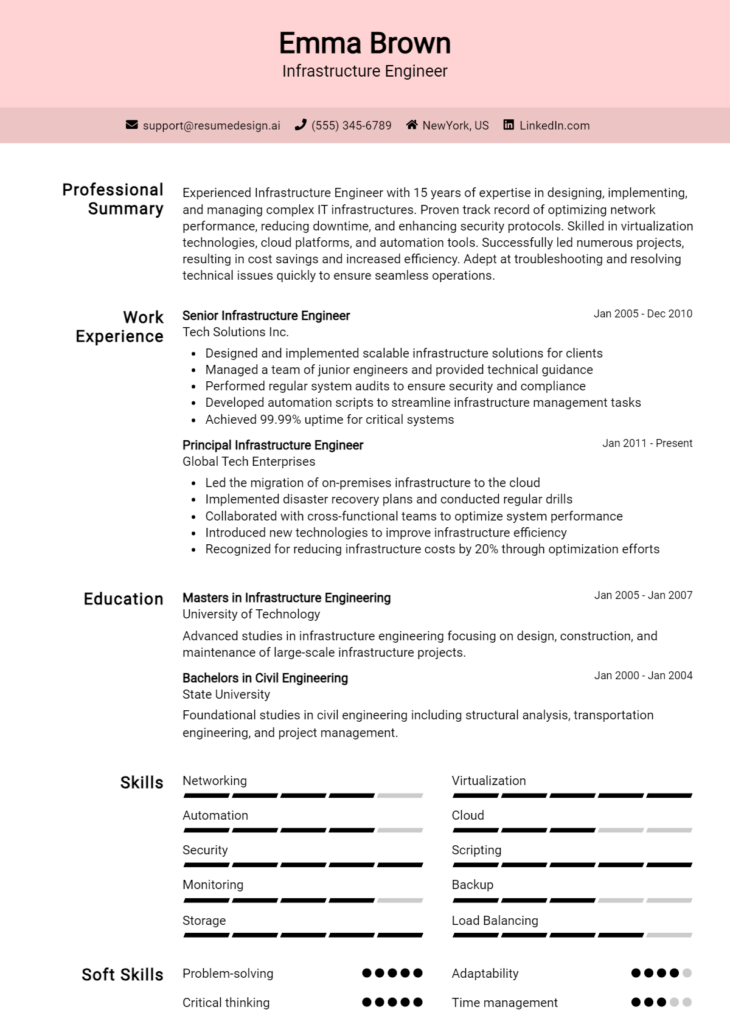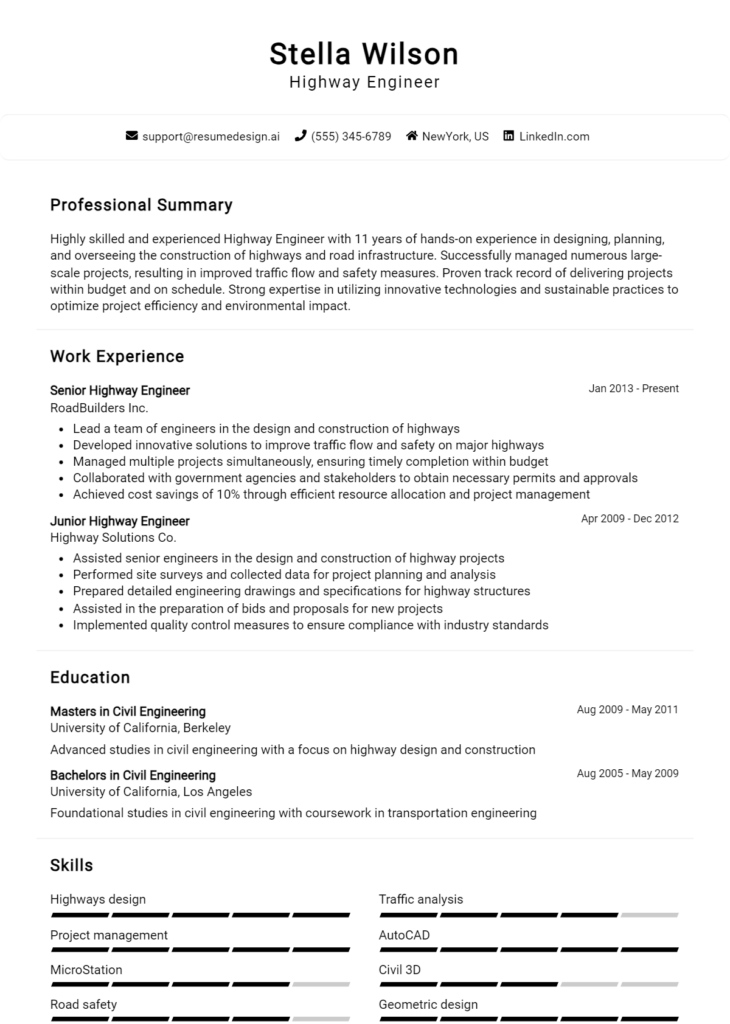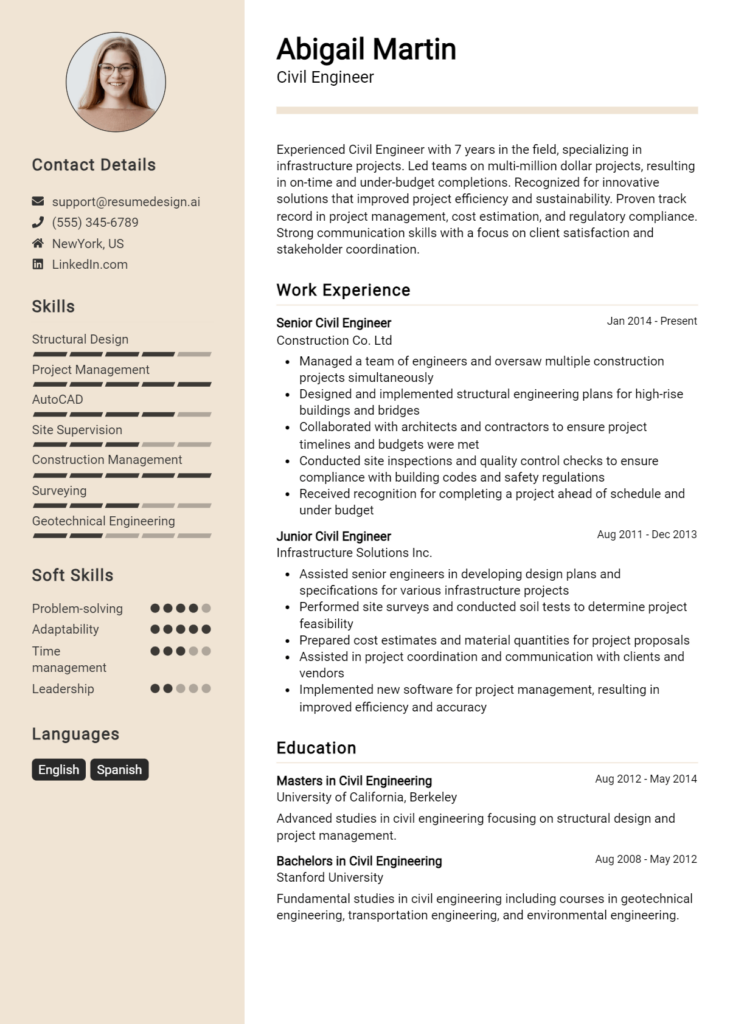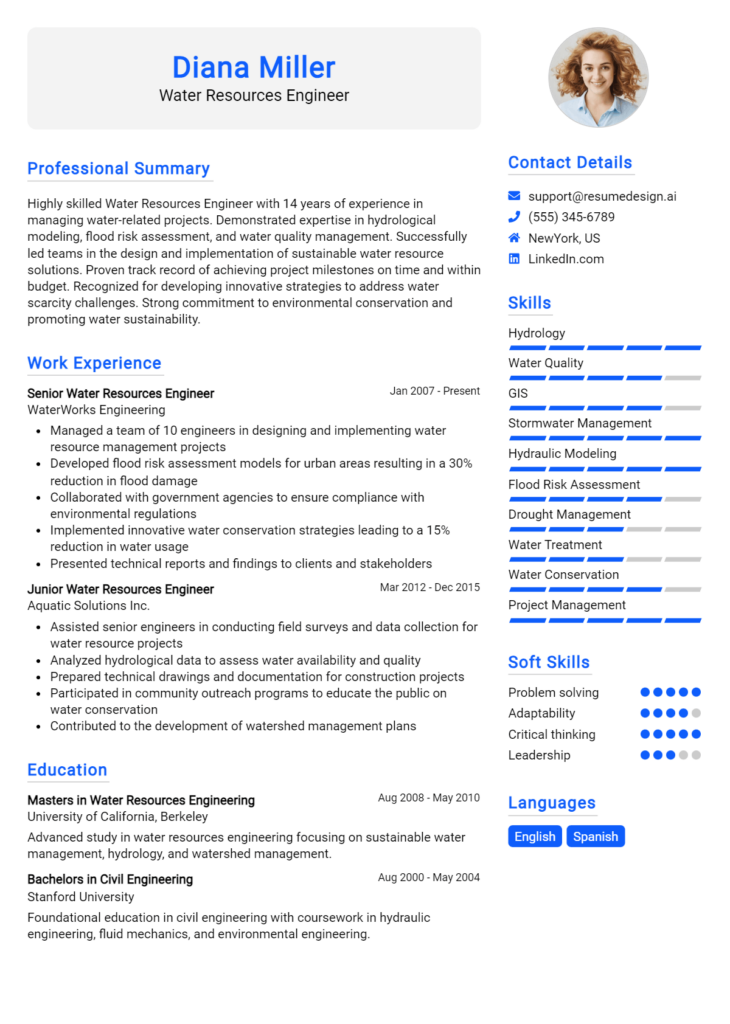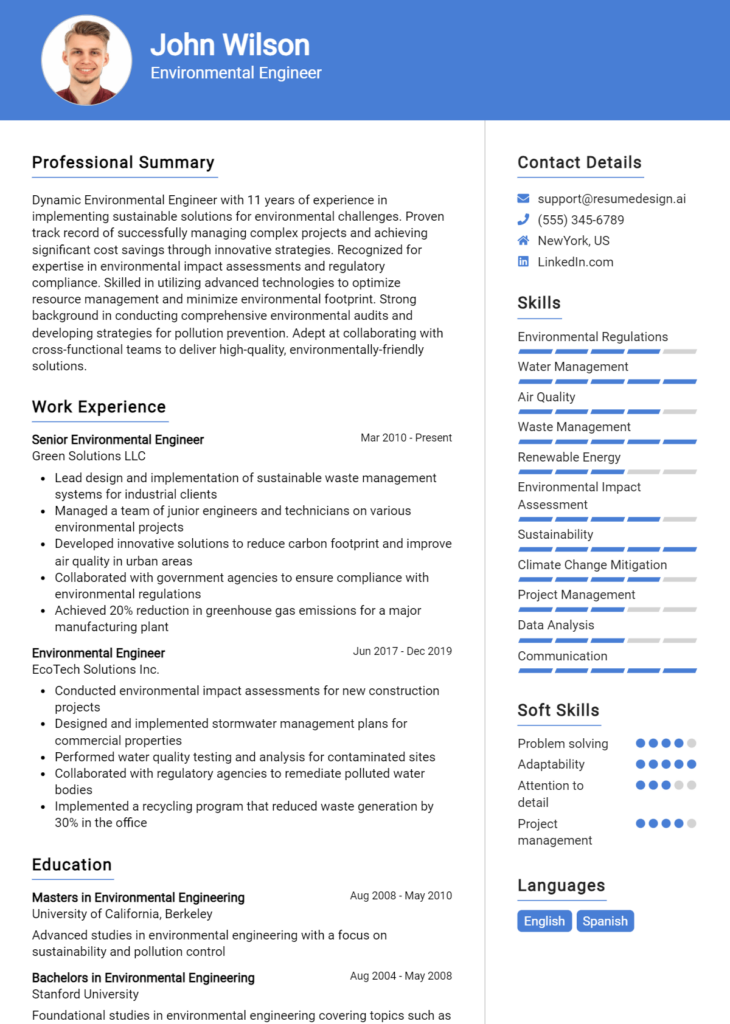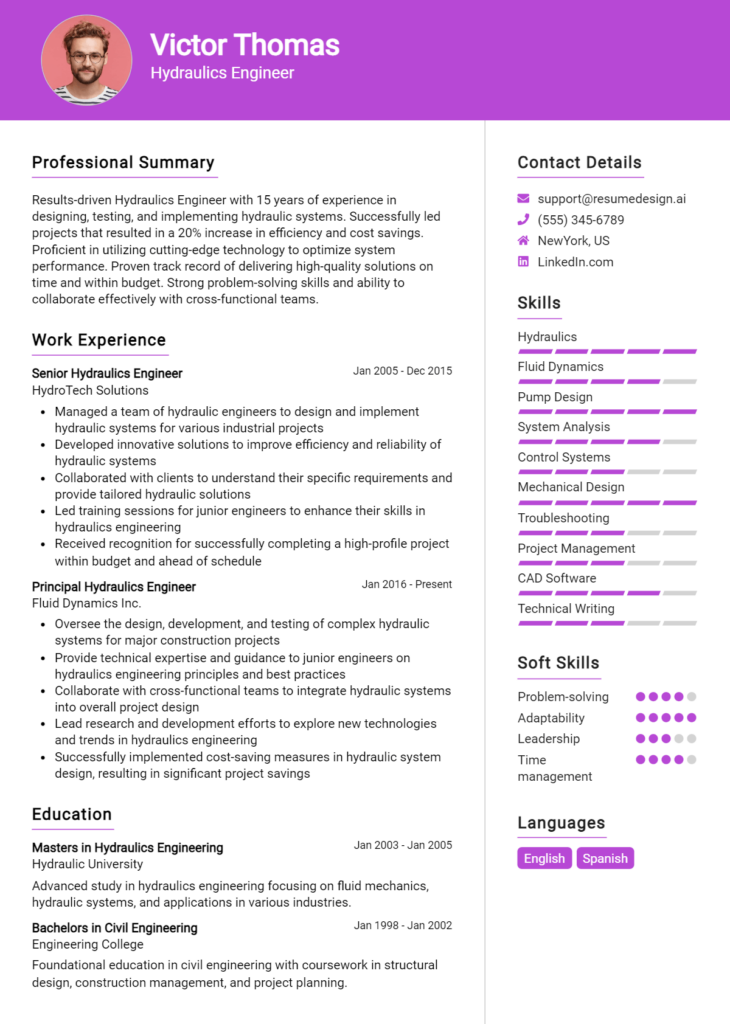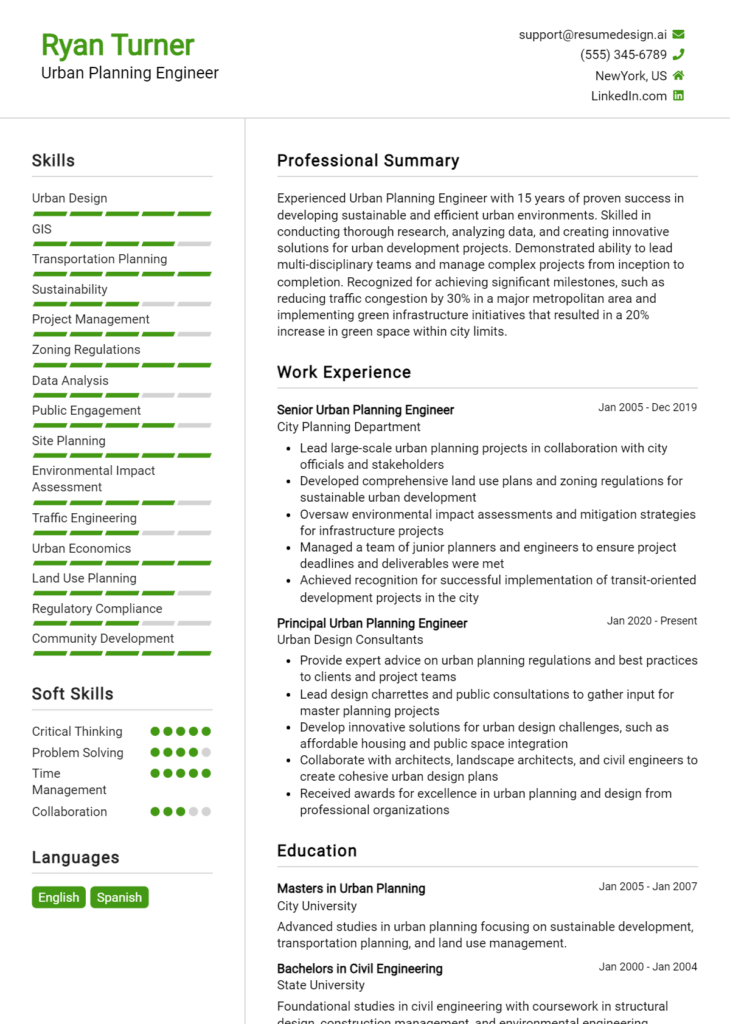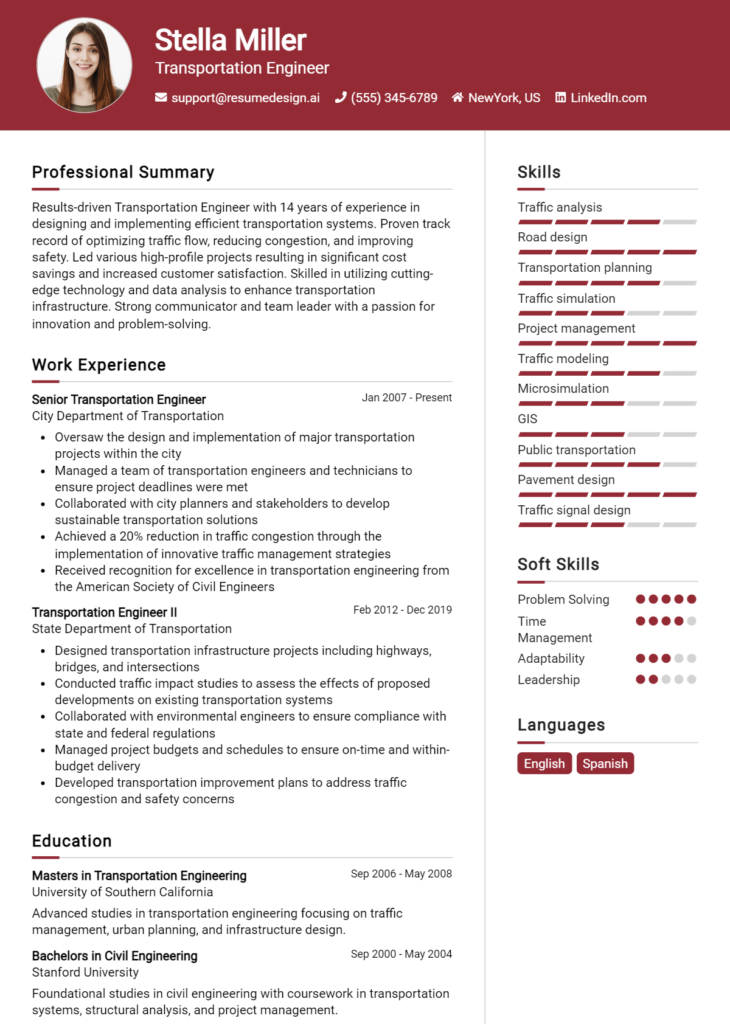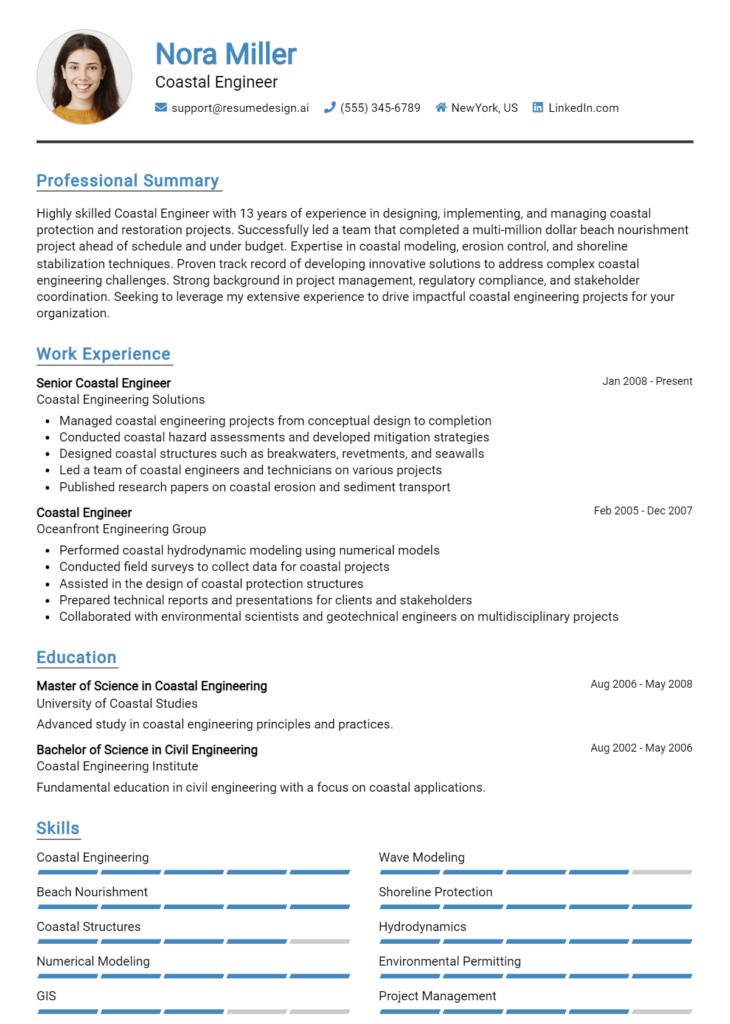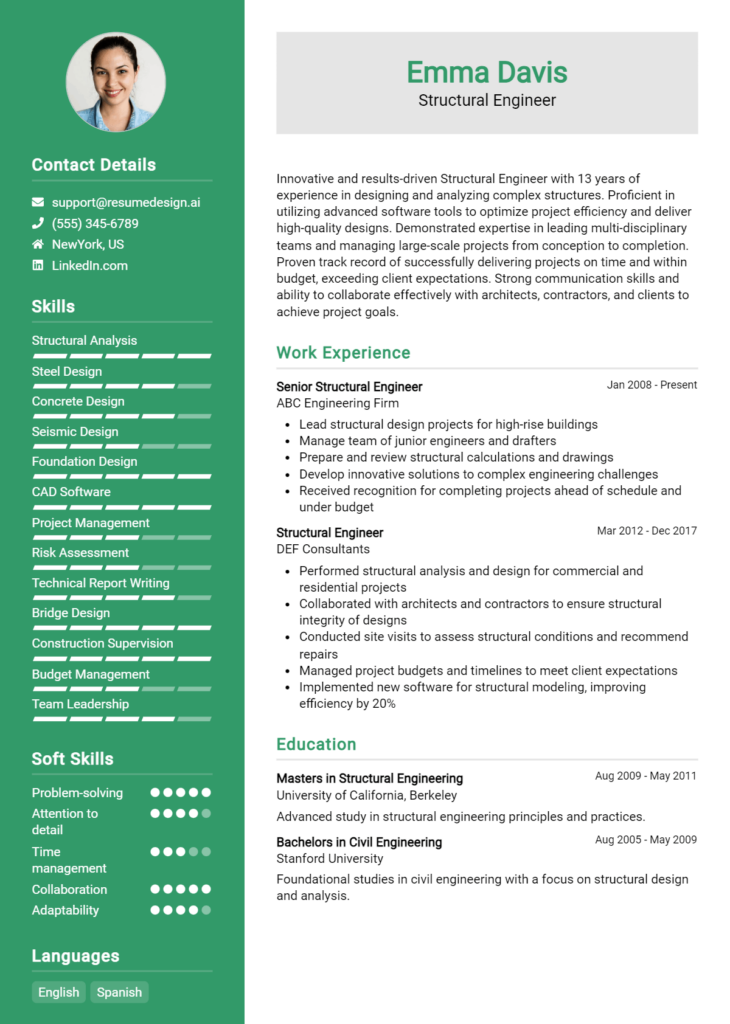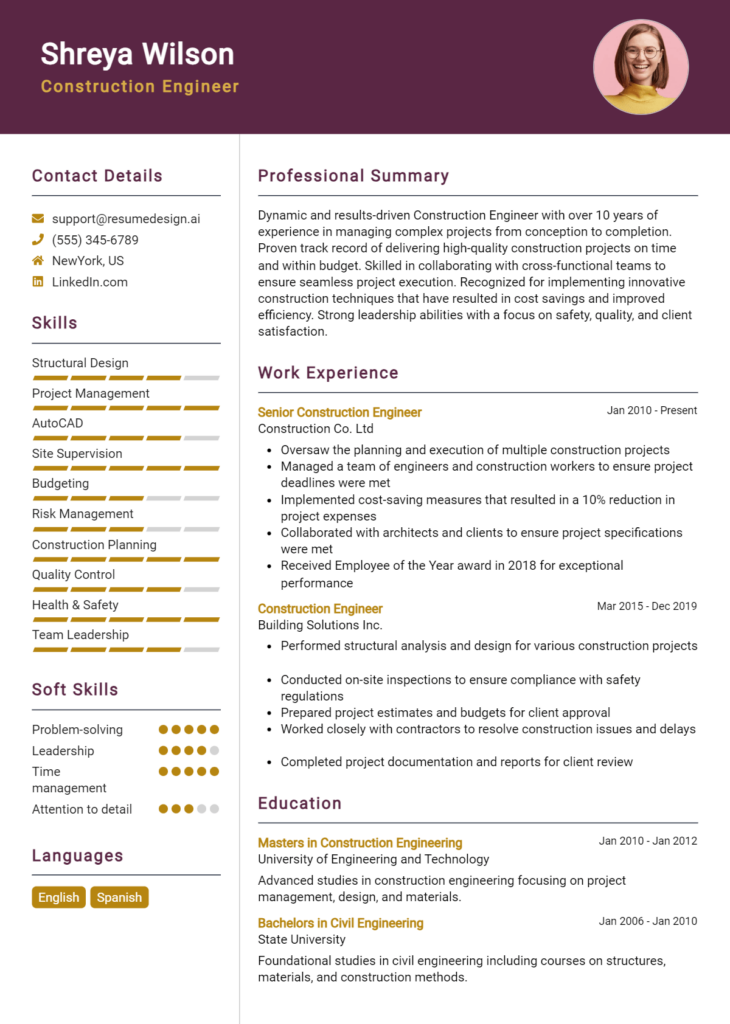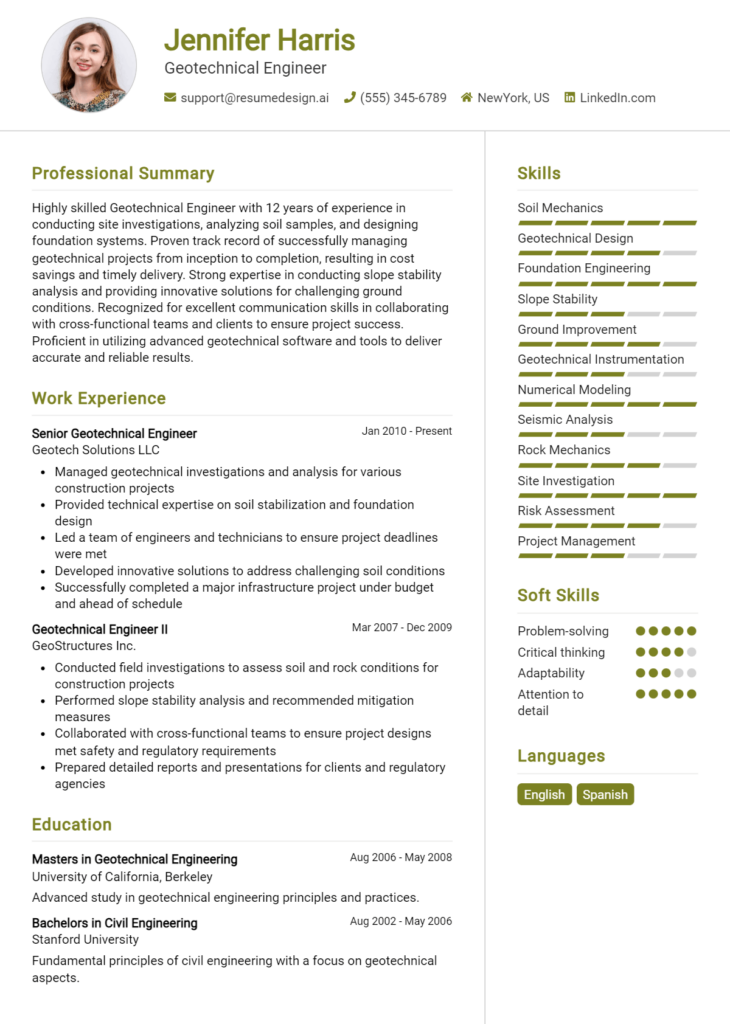Bridge Engineer Core Responsibilities
A Bridge Engineer is responsible for designing, analyzing, and maintaining bridges, ensuring their safety and functionality. This role requires a strong blend of technical expertise, operational insight, and problem-solving skills, allowing the engineer to collaborate effectively across various departments, from design to construction and maintenance. Excellent communication and analytical abilities are crucial in achieving organizational goals, while a well-structured resume can effectively showcase these qualifications, making candidates stand out in a competitive job market.
Common Responsibilities Listed on Bridge Engineer Resume
- Design and analyze bridge structures to ensure safety and compliance with regulations.
- Conduct site inspections and assessments to evaluate existing bridge conditions.
- Collaborate with architects, construction teams, and local authorities on projects.
- Develop detailed engineering plans and specifications for bridge projects.
- Utilize software tools for structural analysis and design simulations.
- Provide technical guidance and support throughout the construction process.
- Prepare reports and documentation for project stakeholders and regulatory agencies.
- Monitor bridge performance and recommend maintenance or upgrades as needed.
- Stay updated on industry trends, materials, and technologies to enhance bridge design.
- Manage project timelines and budgets to ensure efficient project delivery.
- Conduct risk assessments and implement safety measures in design and construction.
High-Level Resume Tips for Bridge Engineer Professionals
In the competitive field of bridge engineering, a well-crafted resume is crucial for standing out to potential employers. Your resume often serves as the first impression you make, and it needs to effectively showcase not just your skills, but also your achievements and contributions to past projects. As a bridge engineer, your experience and technical expertise must be clearly communicated to demonstrate your ability to tackle complex engineering challenges. This guide will provide practical and actionable resume tips specifically tailored for bridge engineer professionals, ensuring that your document reflects your qualifications and sets you apart from the competition.
Top Resume Tips for Bridge Engineer Professionals
- Tailor your resume to match the job description, emphasizing keywords and responsibilities that align with the position.
- Showcase relevant experience by including specific projects where you played a key role, detailing your contributions and the outcomes.
- Quantify your achievements by using numbers, percentages, and data to illustrate the impact of your work (e.g., budget savings, project timelines).
- Highlight industry-specific skills such as structural analysis, design software proficiency, and knowledge of building codes and regulations.
- Include certifications and licenses relevant to bridge engineering, such as Professional Engineer (PE) status, to enhance credibility.
- Utilize a clean and professional format that enhances readability, ensuring that key information stands out.
- Incorporate a summary statement that captures your career highlights and technical expertise in bridge engineering.
- Emphasize soft skills like teamwork, problem-solving, and communication, which are essential for collaborative engineering projects.
- Keep your resume concise—ideally one page—focusing on the most relevant and impactful information.
- Include professional development activities, such as workshops or seminars, to demonstrate commitment to staying current in the field.
By implementing these tips into your resume, you can significantly increase your chances of landing a job in the bridge engineering field. A well-structured resume that highlights your unique qualifications and accomplishments will not only capture the attention of hiring managers but also position you as a strong candidate ready to contribute to innovative engineering solutions.
Why Resume Headlines & Titles are Important for Bridge Engineer
In the competitive field of engineering, particularly for specialized roles like a Bridge Engineer, a well-crafted resume headline or title serves as a critical first impression. This brief yet powerful statement can instantly capture the attention of hiring managers, providing a snapshot of a candidate's key qualifications and expertise. A strong headline should be concise, relevant, and directly aligned with the specific job being applied for, enabling candidates to stand out in a crowded applicant pool and convey their unique value proposition effectively.
Best Practices for Crafting Resume Headlines for Bridge Engineer
- Keep it concise: Aim for a headline that is one to two lines long.
- Be role-specific: Use terminology that reflects the Bridge Engineer position you are targeting.
- Highlight key skills: Incorporate essential skills that are relevant to the job description.
- Include measurable accomplishments: If possible, reference quantifiable successes to enhance credibility.
- Use action-oriented language: Start with strong action verbs to convey dynamism and impact.
- Tailor to the job: Customize your headline for each application to align with the employer's needs.
- Avoid jargon: Use clear and straightforward language to ensure your headline is easily understood.
- Make it compelling: Aim to evoke interest and curiosity about your qualifications and experience.
Example Resume Headlines for Bridge Engineer
Strong Resume Headlines
Innovative Bridge Engineer with 10+ Years of Experience in Designing Sustainable Infrastructure
Award-Winning Bridge Engineer Specializing in Complex Steel and Concrete Structures
Experienced Bridge Engineer with Proven Track Record in Project Management and Cost Reduction
Dynamic Bridge Engineer with Expertise in Seismic Design and Risk Assessment
Weak Resume Headlines
Engineer Looking for New Opportunities
Bridge Engineer
Experienced Professional
The strong headlines are effective because they clearly communicate the candidate's specific expertise, years of experience, and unique accomplishments related to the Bridge Engineer role. They utilize impactful language that resonates with hiring managers and showcases what sets the candidate apart. In contrast, the weak headlines fail to impress due to their vagueness and lack of detail, leaving hiring managers with little to no insight into the candidate's qualifications or suitability for the position.
Writing an Exceptional Bridge Engineer Resume Summary
The resume summary is a critical component for a Bridge Engineer, as it serves as the first impression on hiring managers. A strong summary effectively encapsulates the candidate's key skills, relevant experience, and notable accomplishments in a concise manner. This brief yet impactful overview not only grabs the attention of employers but also highlights the qualifications that align with the specific job role. Tailoring the summary to the job description is essential, as it showcases the candidate's understanding of the position and their readiness to contribute to the organization.
Best Practices for Writing a Bridge Engineer Resume Summary
- Quantify Achievements: Use numbers and metrics to illustrate the impact of your work.
- Focus on Relevant Skills: Highlight specific technical skills and competencies pertinent to bridge engineering.
- Tailor to the Job Description: Customize your summary to reflect the requirements and keywords from the job posting.
- Be Concise: Keep your summary brief, ideally 2-4 sentences, while delivering key information.
- Showcase Key Accomplishments: Mention specific projects or milestones that demonstrate your expertise.
- Use Active Language: Employ strong action verbs to convey your contributions and responsibilities.
- Highlight Certifications: Include any relevant certifications or licenses that add value to your profile.
- Reflect Your Passion: Convey enthusiasm for bridge engineering and a commitment to quality and safety.
Example Bridge Engineer Resume Summaries
Strong Resume Summaries
Dynamic Bridge Engineer with over 10 years of experience in designing and overseeing the construction of large-scale infrastructure projects, resulting in a 25% reduction in project completion times through innovative engineering solutions.
Results-driven Bridge Engineer skilled in advanced structural analysis, with a proven track record of successfully managing projects valued at over $5 million while ensuring compliance with safety regulations and design standards.
Experienced in the development of bridge inspection protocols and maintenance strategies, leading to a 30% improvement in asset longevity and a significant reduction in repair costs for municipal projects.
Proficient Bridge Engineer with extensive knowledge in CAD software and a background in environmental impact assessments, contributing to sustainable design practices that have earned recognition from local authorities.
Weak Resume Summaries
Bridge Engineer with several years of experience looking for a new opportunity to use my skills.
Dedicated engineer who has worked on various projects and is eager to join a new team.
The strong resume summaries are considered effective because they provide specific details about achievements, quantify results, and highlight relevant skills that align with the bridge engineering role. In contrast, the weak summaries lack specificity and fail to convey any measurable impact or unique qualifications, making them less compelling to hiring managers.
Work Experience Section for Bridge Engineer Resume
The work experience section of a Bridge Engineer resume is a critical component that effectively showcases the candidate's technical skills and project management capabilities. This section not only highlights the individual's ability to design, analyze, and oversee the construction of bridges but also reflects their aptitude for leading teams and delivering high-quality engineering solutions that meet industry standards. By quantifying achievements and aligning experiences with the specific demands of the bridge engineering field, candidates can present a compelling case for their qualifications and readiness for the role.
Best Practices for Bridge Engineer Work Experience
- Emphasize technical skills relevant to bridge design and analysis, such as proficiency in software like AutoCAD and SAP2000.
- Quantify achievements with specific metrics, such as reduced project timelines or cost savings.
- Highlight collaborative projects that involved cross-functional teams, demonstrating your ability to work well with others.
- Use action verbs to convey leadership and initiative in your work descriptions.
- Align your experiences with industry standards and protocols, such as AASHTO specifications.
- Include any certifications or professional development relevant to bridge engineering.
- Provide context for your contributions by mentioning the scale and significance of the projects you worked on.
- Focus on problem-solving experiences where you overcame challenges in bridge engineering projects.
Example Work Experiences for Bridge Engineer
Strong Experiences
- Led the design and construction of a 500-meter cable-stayed bridge, completing the project 20% under budget and two months ahead of schedule.
- Managed a team of 10 engineers in the evaluation and retrofitting of three aging bridges, resulting in a 30% increase in load capacity and extended service life.
- Implemented a new project management software that reduced documentation errors by 50%, enhancing overall project efficiency.
- Collaborated with local government officials to secure permits and community support for a new pedestrian bridge, increasing public accessibility by 40%.
Weak Experiences
- Worked on various bridge projects.
- Assisted in some design tasks.
- Participated in meetings about bridge engineering.
- Helped with documentation for bridge construction.
The examples categorized as strong highlight specific achievements and quantifiable results that demonstrate the candidate's technical leadership and collaborative skills. They provide concrete evidence of successful project outcomes, such as cost savings and increased efficiency. In contrast, the weak experiences lack detail and fail to convey the candidate's specific contributions or the impact of their work, making it difficult for potential employers to assess their qualifications and capabilities effectively.
Education and Certifications Section for Bridge Engineer Resume
The education and certifications section of a Bridge Engineer resume is crucial as it showcases the candidate's academic qualifications and industry-related credentials. This section not only reflects the foundational knowledge necessary for the role but also highlights ongoing professional development through certifications and specialized training. By detailing relevant coursework and recognized certifications, candidates can significantly enhance their credibility and demonstrate their alignment with the demands of the job. It serves as a compelling indicator of their commitment to continuous learning and expertise in the field of bridge engineering.
Best Practices for Bridge Engineer Education and Certifications
- List educational qualifications in reverse chronological order, starting with the most recent degree.
- Include relevant coursework that directly relates to bridge design, structural analysis, and materials engineering.
- Highlight industry-recognized certifications, such as Professional Engineer (PE) or Bridge Design certification.
- Emphasize specialized training or workshops that enhance skills in bridge construction, safety, or project management.
- Use clear and concise language to describe each qualification, focusing on key achievements or projects.
- Ensure that all listed credentials are up-to-date and accurately reflect the candidate’s current capabilities.
- Avoid including irrelevant degrees or certifications that do not contribute to the candidate’s qualifications for the role.
- Consider including memberships in professional organizations related to civil or structural engineering.
Example Education and Certifications for Bridge Engineer
Strong Examples
- M.S. in Civil Engineering, University of XYZ, 2022 - Specialization in Structural Engineering
- Professional Engineer (PE) License, State of ABC, 2023
- Certificate in Bridge Design and Analysis, Institute of Civil Engineers, 2021
- B.S. in Civil Engineering, University of XYZ, 2020 - Relevant Coursework: Bridge Engineering, Structural Dynamics
Weak Examples
- Diploma in Graphic Design, College of Arts, 2019
- Certification in Basic Computer Skills, Online Learning Platform, 2020
- B.S. in Environmental Science, University of ABC, 2018
- Certificate in Basic Project Management, Non-Engineering Institution, 2021
The strong examples demonstrate relevant degrees and certifications that align closely with the requirements for a Bridge Engineer, showcasing both specialized knowledge and professional recognition. In contrast, the weak examples highlight qualifications that either do not pertain to bridge engineering or are outdated and irrelevant to the candidate's desired career path. This distinction is important as it underscores the need for targeted education and training to enhance employability in the field.
Top Skills & Keywords for Bridge Engineer Resume
As a Bridge Engineer, showcasing the right skills on your resume is crucial for standing out in a competitive job market. Employers seek candidates who not only possess essential technical knowledge but also demonstrate strong interpersonal abilities that facilitate teamwork and project management. Highlighting both hard and soft skills allows you to present a well-rounded profile, showcasing your capability to design, analyze, and maintain bridge structures, while also collaborating effectively with diverse teams and stakeholders. By strategically incorporating these skills into your resume, you can align your qualifications with the demands of the role and increase your chances of securing an interview.
Top Hard & Soft Skills for Bridge Engineer
Soft Skills
- Communication
- Teamwork
- Problem-solving
- Attention to detail
- Time management
- Leadership
- Adaptability
- Critical thinking
- Project management
- Conflict resolution
- Creativity
- Negotiation
Hard Skills
- Structural analysis
- Materials science
- CAD software proficiency
- Bridge design standards and codes
- Geotechnical engineering knowledge
- Load and stress analysis
- Construction methods and management
- Surveying techniques
- Computer programming (e.g., MATLAB, Python)
- Quality assurance and control
- Risk assessment
- Environmental impact analysis
- AutoCAD and Revit expertise
- Finite element analysis (FEA)
- Cost estimation and budgeting
By emphasizing your skills alongside your relevant work experience, you can create a compelling resume that effectively communicates your qualifications as a Bridge Engineer.
Stand Out with a Winning Bridge Engineer Cover Letter
I am writing to express my interest in the Bridge Engineer position at [Company Name], as advertised on [where you found the job posting]. With a Bachelor’s degree in Civil Engineering and over [X years] of experience specializing in the design and analysis of bridge structures, I am confident in my ability to contribute effectively to your team. My extensive experience in managing complex bridge projects from conceptual design to completion has equipped me with the skills and knowledge necessary to excel in this role.
In my previous position at [Previous Company Name], I successfully led a team of engineers in the design of [specific project or type of bridge], where we not only met but exceeded client expectations while adhering to tight deadlines and budget constraints. My expertise in using advanced engineering software, such as AutoCAD and SAP2000, allows me to create accurate and detailed designs, ensuring the structural integrity and safety of the bridges. Additionally, my strong background in conducting load analysis and risk assessment has been instrumental in identifying potential issues early in the design process, which has significantly reduced project delays.
Collaboration is crucial in bridge engineering, and I pride myself on my ability to work effectively with multidisciplinary teams, including architects, urban planners, and construction managers. My strong communication skills enable me to present complex engineering concepts in an easily understandable manner, fostering a productive dialogue among team members and stakeholders. I am also committed to staying updated on the latest industry trends and advancements, which I believe is vital for the continuous improvement of our engineering practices.
I am excited about the opportunity to bring my unique blend of skills and experience to [Company Name]. I am particularly drawn to your company’s commitment to sustainable engineering solutions and innovative design practices. I look forward to the possibility of discussing how I can contribute to your ongoing projects and help shape the future of bridge engineering at [Company Name]. Thank you for considering my application.
Common Mistakes to Avoid in a Bridge Engineer Resume
When crafting a resume for a bridge engineer position, it’s crucial to present your skills and experience effectively. However, many candidates often overlook key elements that can impact their chances of landing an interview. Avoiding common mistakes can significantly enhance your resume's appeal to potential employers. Here are some frequent pitfalls to watch out for:
Generic Objective Statements: Using a one-size-fits-all objective can make your resume blend in with others. Tailor your objective to reflect your specific goals and how they align with the company's mission.
Overloading with Technical Jargon: While technical skills are vital, bombarding the reader with industry-specific terms can be off-putting. Use clear language and provide context for technical terms to ensure your resume is accessible to all readers.
Ignoring Soft Skills: Focusing solely on technical expertise can lead to an unbalanced resume. Highlighting soft skills such as teamwork, communication, and problem-solving abilities is essential, as these are crucial in collaborative engineering environments.
Lack of Quantifiable Achievements: Failing to include measurable outcomes for your projects can weaken your resume. Use specific metrics, such as project cost savings or time efficiency improvements, to showcase your contributions.
Inconsistent Formatting: A cluttered or inconsistent format can distract from your accomplishments. Ensure your resume has a clean, professional layout with uniform font sizes, bullet points, and spacing for easy readability.
Neglecting Relevant Experience: Omitting internships or relevant projects can undervalue your experience. Include all pertinent work, even if it was temporary or voluntary, to demonstrate your commitment and breadth of knowledge.
Excessive Length: A resume that is too long can deter hiring managers from reading it fully. Aim to keep your resume concise, ideally to one page, while still providing enough detail to showcase your qualifications.
Failing to Customize for Each Position: Sending out the same resume for every application can be detrimental. Tailor your resume to highlight the skills and experience that align specifically with the job description of the position you are applying for.
Conclusion
As we conclude our exploration into the pivotal role of a Bridge Engineer, it's essential to highlight the key responsibilities and skills that define this profession. Bridge Engineers play a critical role in designing, constructing, and maintaining the vital structures that connect communities and facilitate transportation. Their work encompasses a deep understanding of engineering principles, materials science, and innovative design practices. Additionally, they must be adept at project management, regulatory compliance, and collaboration with cross-functional teams, ensuring that each project is completed safely, efficiently, and on time.
In light of these insights, it is crucial for current and aspiring Bridge Engineers to present their qualifications effectively through a well-crafted resume. A strong resume not only showcases your technical skills and project experiences but also emphasizes your problem-solving capabilities and teamwork.
Now is the perfect time to review your Bridge Engineer resume to ensure it reflects your expertise and aligns with industry standards. To assist you in this process, consider utilizing our available resources, including a variety of resume templates, an intuitive resume builder, comprehensive resume examples, and tailored cover letter templates. Take action today to enhance your professional presentation and stand out in the competitive field of Bridge Engineering!

